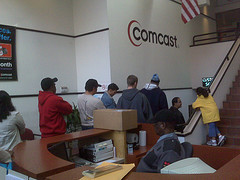Do Cable Companies Deliberately Make It Hard To Return Set-Top Boxes?

Do images like this make the idea of cancelling cable so unpleasant that some people are keeping their service rather than facing the hassle? (photo: honeylamb)
That’s the theory put forth by the Harvard Business Review’s Justin Fox, who recently made the exodus from Kabletown when he moved out of a Comcast-controlled area.
His first attempt to return his equipment failed, as the local Comcast office simply decided to close down for half an hour in the middle of the day. He returned later in the afternoon, and stood in an unmoving line with other box-returners.
A customer from the back of the line asked if he could leave his box on the counter since he’d already settled up over the phone. The woman at the counter said he wouldn’t be getting a receipt and he’d run the risk of having someone take his equipment.
Since that seemed like a slim possibility, Fox decided to leave his equipment at the counter, at which point he says the Comcast employee threatened to call the police on him.
Regardless, he left it there, and as you have probably guessed, he has been charged the full $360 for unreturned equipment.
This all led Fox to ponder why, if libraries, banks, and video stores have all figured out convenient ways to return things, it is such a huge pain in the butt to return your cable box?
He writes:
The most plausible explanation for this state of affairs is the simplest one: The equipment-return rigamarole is a customer retention strategy. Customers who can’t conceivably be retained, like me, are just collateral damage in the effort to scare potential cable defectors into staying put. If that’s right, the cable operators will only get more aggressive about this as the years go by. Their market penetration has probably peaked, as younger consumers… increasingly opt for cheaper workarounds via their Internet connections. So the clearest path to continued profit is to lock in existing customers, and find ways to charge them more… the equipment-return thing is pure coercion. Machiavelli would have been impressed.
To clarify, Fox isn’t arguing that Comcast and other cable companies are attempting to retain customers who’ve already made the decision to leave. Instead, he’s theorizing that the industry is deliberately cultivating this reputation of difficult cancellation processes in order to preemptively discourage people from canceling their service or moving to another provider.
The idea isn’t without merits. It works well in the banking industry, where one of the main reasons consumers choose to not switch financial institutions is that it would be a huge pain to do so. The mere notion of having to go through all that hassle is enough to put people off the switch.
Thus the Machiavelli reference, as Fox believes that cable companies want you to fear them (and their onerous processes) rather than love them for being convenient.
And since the cable industry is effectively non-competitive, with service availability being determined almost solely by your street address, there is no incentive for one company to come out with a cancellation and equipment-return process that is simple and convenient.
“[R]aging against the cable machine is a national pastime,” concludes Fox. “But actually doing something about it, well, that’s too scary.”
Want more consumer news? Visit our parent organization, Consumer Reports, for the latest on scams, recalls, and other consumer issues.

